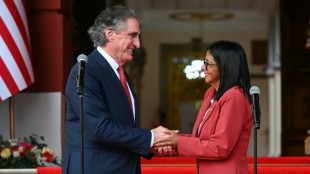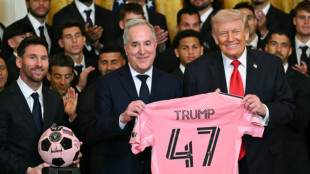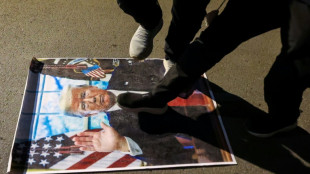-
 Iran missile barrage sparks explosions over Tel Aviv
Iran missile barrage sparks explosions over Tel Aviv
-
US says Venezuela to protect mining firms as diplomatic ties restored

-
 Trump honors Messi and MLS Cup champion Miami teammates
Trump honors Messi and MLS Cup champion Miami teammates
-
Dismal Spurs can still avoid relegation vows Tudor

-
 Berger sets early pace at Arnold Palmer with 'unbelievable' 63
Berger sets early pace at Arnold Palmer with 'unbelievable' 63
-
Morocco part company with coach Regragui as World Cup looms

-
 Lens beat Lyon on penalties to reach French Cup semis
Lens beat Lyon on penalties to reach French Cup semis
-
El Salvador's Bukele holding dozens of political prisoners: rights group

-
 With Iran war, US goes it alone like never before
With Iran war, US goes it alone like never before
-
Spurs slip deeper into relegation trouble after loss to Palace

-
 European, US stocks back in sell-off mode as oil prices surge
European, US stocks back in sell-off mode as oil prices surge
-
Pete Hegseth: Trump's Iran war attack dog

-
 Celtics' Tatum could make injury return on Friday
Celtics' Tatum could make injury return on Friday
-
'Enemy at home': Iranian authorities tighten grip as war rages

-
 Bethell set for 'hell of a career', says England captain Brook
Bethell set for 'hell of a career', says England captain Brook
-
France coach Galthie slams Scotland for 'smallest changing room in the world'

-
 Medvedev arrives in Indian Wells after being stranded in Dubai
Medvedev arrives in Indian Wells after being stranded in Dubai
-
Trump fires homeland security chief Kristi Noem

-
 Mideast war risks pulling more in as conflict boils over
Mideast war risks pulling more in as conflict boils over
-
Wales' James Botham 'sledged' by grandfather Ian Botham after Six Nations error

-
 India hero Samson eyes 'one more' big knock in T20 World Cup final
India hero Samson eyes 'one more' big knock in T20 World Cup final
-
Britney Spears detained on suspicion of driving while intoxicated

-
 Grooming makes Crufts debut as UK dog show widens offer
Grooming makes Crufts debut as UK dog show widens offer
-
Townsend insists Scots' focus solely on France not Six Nations title race

-
 UK sends more fighter jets to Gulf: PM
UK sends more fighter jets to Gulf: PM
-
EU to ban plant-based 'bacon' but veggie 'burgers' survive chop

-
 Leagues Cup to hold matches in Mexico for first time
Leagues Cup to hold matches in Mexico for first time
-
India reach T20 World Cup final after England fail in epic chase

-
 Conservative Anglicans press opposition to Church's first woman leader
Conservative Anglicans press opposition to Church's first woman leader
-
Iran players sing anthem and salute at Women's Asian Cup

-
 India beat England in high-scoring T20 World Cup semi-final
India beat England in high-scoring T20 World Cup semi-final
-
Mideast war traps 20,000 seafarers, 15,000 cruise passengers in Gulf

-
 Italy bring back Brex to face England
Italy bring back Brex to face England
-
French policeman to be tried over 2023 killing of teen

-
 Oil prices rise, stocks slide as Middle East war stirs supply concerns
Oil prices rise, stocks slide as Middle East war stirs supply concerns
-
More flights take off despite continued fighting in Middle East

-
 Ukraine, Russia free 200 POWs each
Ukraine, Russia free 200 POWs each
-
Middle East war halts work at WHO's Dubai emergency hub

-
 Paramount's Ellison vows CNN editorial independence
Paramount's Ellison vows CNN editorial independence
-
US says attacks on alleged drug boats have spooked traffickers

-
 Dempsey returns as Scotland shuffle pack for Six Nations clash against France
Dempsey returns as Scotland shuffle pack for Six Nations clash against France
-
India pile up 253-7 against England in T20 World Cup semi-final

-
 Wary Europeans pledge 'defensive' military aid in Mideast war
Wary Europeans pledge 'defensive' military aid in Mideast war
-
Seven countries to boycott Paralympics ceremony over Russia: organisers

-
 UK's Crufts dog show opens with growing global appeal
UK's Crufts dog show opens with growing global appeal
-
PSG prepare for Chelsea clash with Monaco rematch

-
 Google opens AI centre as Berlin defends US tech reliance
Google opens AI centre as Berlin defends US tech reliance
-
Second Iranian ship nears Sri Lanka after submarine attack

-
 Portugal mourns acclaimed writer Antonio Lobo Antunes
Portugal mourns acclaimed writer Antonio Lobo Antunes
-
Union loses fight against Tesla at German factory

China, Trump, and the power of war?
As tensions in the Taiwan Strait continue to simmer, foreign policy experts are exploring a hypothetical scenario: If China were to launch a military attack on Taiwan, would a newly re-elected President Donald Trump intervene with the full might of the U.S. armed forces to defend the island? This question underscores the complex interplay of regional alliances, global power dynamics, and the unpredictability of American politics.
Setting the Stage: China’s Military Ambitions
Historical Context:
China regards Taiwan as a breakaway province destined for reunification—by force if necessary.
Modern Capabilities:
The People’s Liberation Army (PLA) has accelerated its modernization program, including advancements in naval power, ballistic missiles, and air force technology.
Regional Impact:
An attack on Taiwan could destabilize not only East Asia but also the global economy, given Taiwan’s crucial role in semiconductor manufacturing and maritime trade routes.
The Trump Factor: A New Administration’s Possible Response
Campaign Promises and Rhetoric:
Donald Trump has a record of strong nationalist rhetoric, emphasizing American military strength. If re-elected, he might lean into campaign pledges to protect U.S. interests abroad, including key allies and partners.
Previous Policies on China:
In his earlier administration, Trump took a hardline stance against Beijing on trade, technology, and security. This history suggests he could respond forcefully if China initiates open conflict.
Alliance with Taiwan:
Although the U.S. does not maintain formal diplomatic ties with Taipei, it is bound by the Taiwan Relations Act to provide defensive support. A President Trump might interpret this as a mandate to escalate, including mobilizing U.S. forces.
Potential Military Scenarios
Naval Blockade:
The U.S. Navy could intervene by establishing a defensive perimeter around Taiwan, deterring Chinese amphibious assaults. Warship deployments to the region would send a clear signal of U.S. resolve, but also increase the risk of direct engagement.
Air Superiority Campaign:
If China’s air force attempted to dominate the skies over Taiwan, the U.S. Air Force and Navy’s carrier air wings could provide critical support to Taiwan’s defense. This scenario would significantly escalate hostilities, potentially leading to sustained aerial combat.
Economic and Cyber Warfare:
Rather than committing large numbers of troops, Trump could opt for widespread sanctions on China, coupled with cyber operations to disrupt PLA communication and logistics. This approach would be aggressive yet potentially less risky than a full-scale military confrontation.
Risks and Global Ramifications
Escalation to Major Conflict:
Direct clashes between the U.S. and China could spiral rapidly, raising concerns about nuclear brinkmanship.
Economic Fallout:
Heightened tensions may lead to severe disruptions in global supply chains, especially regarding technology and semiconductor industries.
International Alliances:
A U.S. military response would likely draw in regional allies such as Japan, South Korea, and Australia, with NATO partners possibly offering political or limited logistical support.
Diplomatic Alternatives
Negotiated Settlements: Even in a crisis, there might be space for last-minute talks hosted by neutral countries or facilitated by international bodies like the United Nations. Multinational Coalitions: The U.S. might seek to build coalitions with allies in Europe and Asia to present a united front, pressuring Beijing to halt aggression.
Conclusion: An Uncertain Future
Should China take the drastic step of attacking Taiwan, the question of American intervention under a potential new Trump administration looms large. Historical precedent—along with Trump’s combative stance on foreign policy—suggests a robust response could follow. Yet the costs, both human and economic, would be staggering for all sides involved.
In this hypothetical scenario, much depends on Beijing’s calculations of risk versus reward, as well as Trump’s willingness to gamble on a major conflict to assert U.S. influence and uphold a promise to protect American allies. Ultimately, the future of Taiwan’s sovereignty could hinge on whether deterrence succeeds—or if the world’s two largest economies find themselves at the brink of war.

India-Pakistan War Fears Grow

Mexico defies Trump's demands

Iran's nuclear dilemma: peace or war?

Trump's expanded tariff risk

East Asia united against Trump

India-Pakistan Tensions Surge

China Strikes Back: Tariff War

Spain: China's Gateway to Europe

Europe's Economic Self-Sabotage

Trump fails due to Russia's tough stance

Pope Francis: A Transformative Legacy




